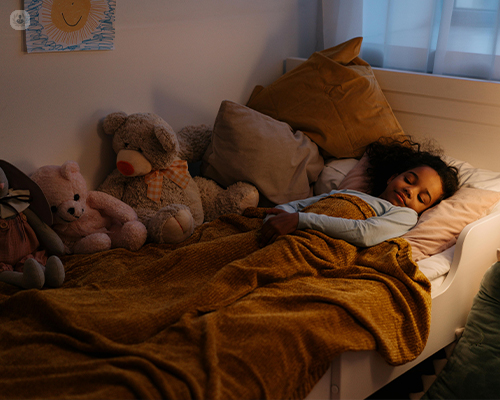Understanding and managing bedwetting: a guide for parents
Written in association with:Bedwetting, also called enuresis, is quite normal for children to do as they are still learning how to control their bladders. When babies are born, they are unable to control their bladders and bowels – rightfully so! – and parents will put them in diapers so that they can “go potty” whenever. But as they start developing communication skills and independent mobility once they’re a little older, between 18 months to three years, they will indicate their readiness to use the toilet themselves. Leading paediatrician Dr Munir Ahmed explains bedwetting in this article so that parents can understand why it happens, and how it can be managed.

By the age of four, most children should be able to get through the day without an incident. However, the bladder control they may learn in the daytime is not necessarily transferrable to the nighttime when they sleep. It is not abnormal for children to still be susceptible to wetting the bed now and then, but it should not be a frequent occurrence. Statistics show that 15% of 5 year olds, 10% of 10 year olds and 5% of 15 year olds can sometimes have episodes of bed-wetting. If by the age of six, a child is still bedwetting consistently, there may need to be intervention and active treatment to address this issue.
What are the reasons behind bedwetting?
If the child is having accidents in the daytime or needs the bathroom very often as well as bedwetting, then the child may have bladder overactivity, where the muscles of the bladder contract erratically. They may also have a urine infection and so they should have a check up. If the child is only having accidents in the nighttime and is fine during the day, then that is called monosymptomatic enuresis. It is likely that the child is likely “voiding” in the early hours of the morning. When adults wake up in the morning, it is normally with a full bladder, which will have filled up during sleep and will be voided without difficulty in the toilet. Whereas children, once the bladder is full in their sleep, do not yet have the subconscious bladder control to hold it until wakefulness. It could also be that their bladder cannot stretch enough to hold all the urine overnight. A hormone, an anti-diuretic called vasopressin, is released from the brain and signals to the kidneys to halt urine production at night. Some children either don't produce enough of this hormone, or the kidneys don't respond to it, so more urine is produced than the bladder can accommodate.
Other possible causes of bedwetting are diabetes, urinary tract infections (UTIs), constipation, or stress and anxiety.
How can bedwetting be managed?
For children lacking vasopressin, it can be given in an artificial form, called Desmopressin. The course of the prescription is usually three months.
If the bedwetting is also happening with daytime overactivity, then medications that relax the bladder muscles, known as anticholinergics, are more applicable. This will also help increase the capacity of the bladder for the future.
It may be as simple as training your child to be aware of their body’s signals. There is a specific product, a bedwetting alarm, that is triggered when it senses moisture. The alarm can be built into sleep trousers, a bed mat, or clipped to underwear, so when the alarm signal – a vibration, a loud noise, or both – hopefully wakes the child up before they can wet the bed completely so that they may void in the toilet instead. This should promote an association of waking up when the child feels the urge to urinate.
It's important to be supportive of a child struggling with bedwetting – no one does it purposely, and if they begin to feel shame and anxiety over it, they may begin to hide accidents from you instead. Keep note of your child’s diet, water intake, and bathroom patterns in case there are any correlations to their bedwetting behaviour.
If these methods fail, the child may need to be seen by a paediatric nephrologist for a thorough examination and urine analysis.
If your child is struggling with urinary incontinence, you can book a consultation with Dr Ahmed today via his Top Doctors profile.


